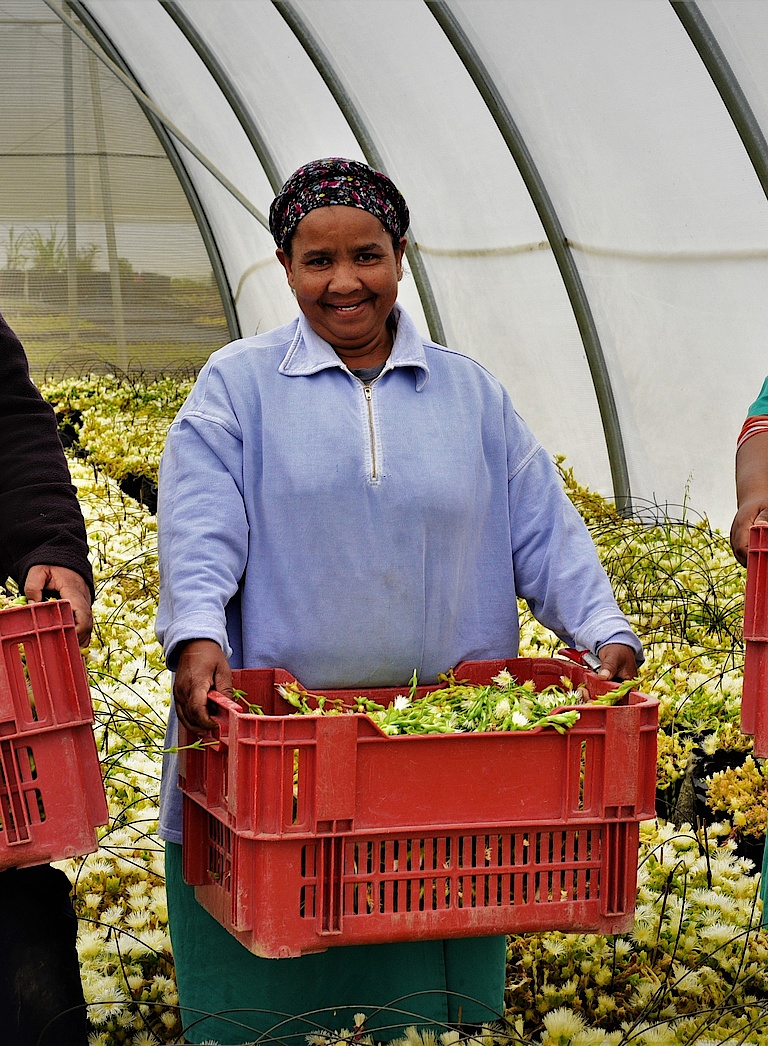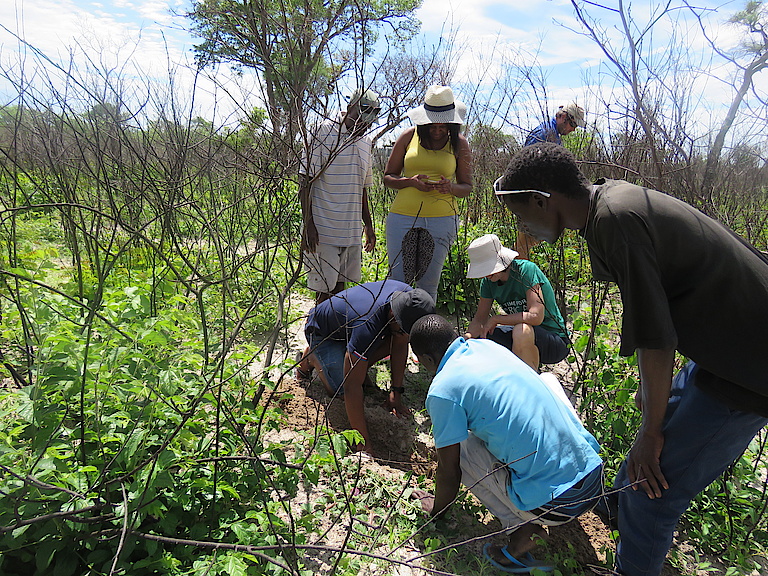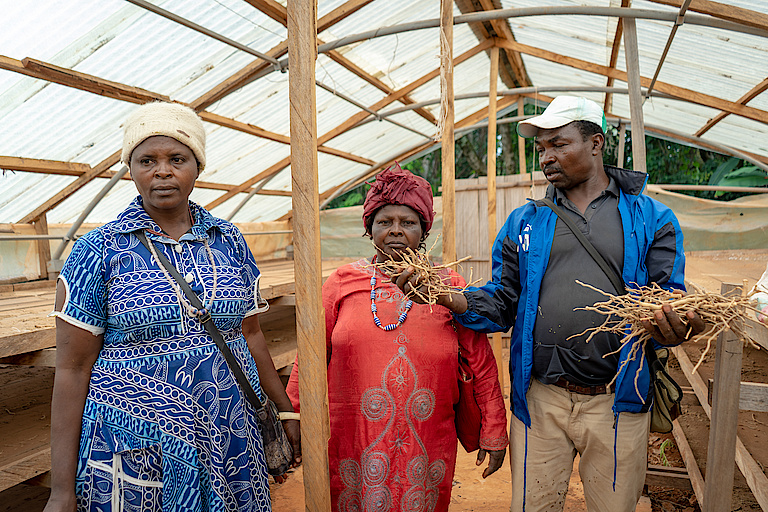Activities
Conditions for implementation of national ABS regulations are improved:
- Country and stakeholder-specific ABS manuals
- Blended training course on ABS contracts
- (Gender-specific) ABS contract negotiation trainings and advice
- IT-based application and information system
- Training of IT-based application and information system
- Guidance and advice on requirements for ABS compliance and permitting procedures
Biodiversity conservation measures as part of benefit-sharing agreements are developed:
- Catalogue existing and develop potential national mechanisms for biodiversity conservation in benefit-sharing
- Knowledge exchange on appropriate financing mechanisms at national and international level
- Mapping of best practices on benefit sharing for conservation among private sector
Market potentials of selected biodiversity-based value chains respecting the UNCTAD BioTrade principles are utilised:
- Cooperation between European and African businesses
- Capacity-building for the implementation of sustainable supply chains and for the creation of new job opportunities
- Supply chain assessments, gap analyses and joint intervention plans
- Compilation of facts and figures on existing and potential resources and value chains
- Guidance on national requirements for ABS compliance and permitting procedures
- Facilitation partnerships on technology transfer to increase local value creation and create job opportunities
German development cooperation is visible as close partner:
- Roundtables with German companies and BMZ
- Events on African-European private sector cooperation
- Public relations material
- International events for the fair and equitable sharing of benefits
Achievements
Phase I
- More than 320,000 ha of wild collection sustainably used
- More than 1,500 ha of cultivated land sustainably used
- More than 7,400 field operators with new or better employment / employability of which 83% were women
- More than 150 stakeholders trained on the valorisation of genetic resources, biological ingredients and ABS contracts, of which 48% were women
- More than 1,3 Mio. € private sector investments mobilized
- Twenty cooperation agreements signed
- Political partners possess several knowledge products, reference guides, videos and online tools to better guide involved stakeholders though national ABS processes
A “Community of Practice” has been established for the institutional partners of the four BioInnovation Africa countries through a virtual exchange platform. These Technical Exchange Sessions are regularly conducted with a view to discuss and advance project-relevant topics and ensure continuous exchange between stakeholders of the BIA countries.
Partnership agreements or MoU have been signed with following organizations/companies and resources, respectively:
- The Body Shop, Weleda, Tropical Forest Products and Guide d’Espoir - value chain support (phase I)
- Firmenich - R&D (phase I)
- Guide d'espoir (guiding hope), Weleda, Norevo - value chain support (phase II)
- V Mane Fils - R&D and value chain set up (phase I)
- V Mane Fils - value chain set up (phase II)
- Behave, Aroma Forest - value chain set up/support (phase I)
- BIO.ES.OIL, Jacarandas International - value chain support (phase II)
- Floribis, V. Mane Fils - value chain set up/support (phase I)
- Floribis, V. Mane Fils - value chain support (phase II)
- Jacarandas Madagascar, BIO.ES.OIL (phase II)
- L’Oréal - value chain support (phase I)
- Seppic / SERDEX - sector approach and market access (phase I)
- Blue Sky Botanics, Namibia Nature Foundation, KAZA Natural Oils – R&D and market access (phase I)
- Blue Sky Botanics, Namibia Nature Foundation – R&D and market access (phase II)
- The Body Shop, Aldivia, Gustav Heess Group and Eudafano Women’s Cooperative (EWC) – value chain support (phase I)
- The Body Shop, Aldivia, Gustav Heess Group and Eudafano Women’s Cooperative (EWC) – value chain support (phase II)
- CRIAA SA-DC – R&D and market access (phase I)
- Kambaku Energy GmbH, SEED Namibia – value chain support (phase I)
- Naturex, NANCi and National Devil’s Claw Export Association Trust (NDCEAT) – standards and market access (phase I)
- Givaudan, NANCi and National Devil’s Claw Export Association Trust (NDCEAT) – standards and market access (phase II)
- Regenerative Essences, IRDNC / Kunene Trust – R&D (phase I)
- V. Mane Fils, IRDNC / Kunene Trust and Parceval - R&D (phase I)
- Dicot Parceval – R&D (phase I)
- Dicot Parceval – R&D (phase II)
- Grounded Management South Africa, SImon Levelt B.V., Gorunded Ingredients B.V., Commonland - value chain support (phase II)
- Kambaku Energy GmbH, Greater Sekhukhune Region Secondary Co-operative (GSRC) – value chain support (phase I)
- International Fragrance Association (IFRA) / International Organization of the Flavor Industry (IOFI), South African Association of the Flavour & Fragrance Industry (SAAFFI), Parceval – sector approach and market access (phase I)
- International Fragrance Association (IFRA) / International Organization of the Flavor Industry (IOFI), South African Association of the Flavour & Fragrance Industry (SAAFFI), Buchu Association – sector approach and market access (phase II)
- Martin Bauer Group, South African Rooibos Council (SARC), UEBT – standards and market access (phase I)
- Martin Bauer Group, South African Rooibos Council (SARC), UEBT – standards and market access (phase II)
- V. Mane Fils, Parceval, Southern African Essential Oil Producers’ Association (SAEOPA) – R&D (phase I)
- V. Mane Fils, Parceval, Honeybush Community of Practice – R&D and value chain set up (phase I)
- Symrise, HERBS-APLENTY - value chain set up (phase I)
- Symrise, Kruger to Canyons Biosphere Region (non-profit) and The Western Cape Nature Conservation Board -R&D, ABS Compliance (phase I)
Further details
Study and Video: ABS & Conservation of Biodiversity - Connecting the Dots
Video: Marula Value Chains in Northern Namibia
Watch the French version of the video here.


